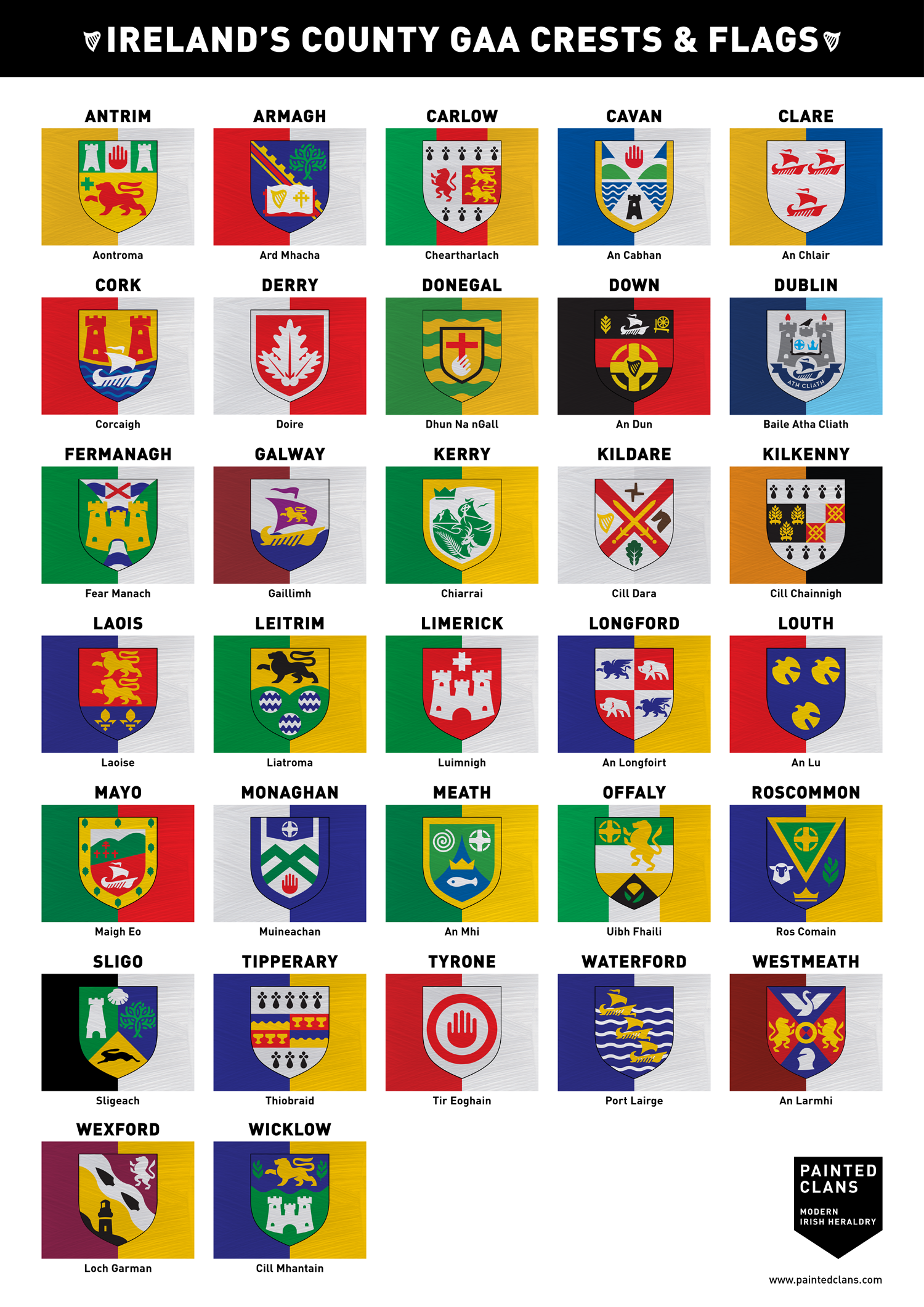What do Ireland’s county names mean?
You have grown up in Ireland all your life. You have wore your county crest with pride. You have navigated this small island with the help of old road signs but have you ever wondered what the Irish language of the county names actually mean?
Ireland’s long rich history of ancient kingdoms, which were imported by Viking and Norman invaders has had a profound effect on the country’s place names. We've put together a list of english translations of Irish county names.
Antrim / Aontroim
Ulster – Established c. 1400, the name translates to “lone ridge” or “lone dwelling.”
Armagh / Ard Mhacha
Ulster – Established c. 1584, the name means “Macha’s height.” Macha was a Celtic goddess said to have given birth to twins after racing a horse.
Carlow / Ceatharlach
Leinster -- Established c. 1306, the name translates to “place of cattle.”
Cavan / An Cabhán
Ulster – Established in 1584, the name translates to “the hollow.”
Clare / An Clár
Munster – Established in 1565, the name translates to “plain.” The county may have been named after the Norman de Clare family. Before 1565, Clare was known as Thomond, which means “North Munster.”
Cork / Corcaigh
Munster – Established c. 1200, the name means “swamp” or "marsh." (But don’t tell anyone from Corcaigh.)
Derry / Doire
Ulster – Established in 1585, the name “Doire” means “oak wood.”
Donegal / Dún na nGall
Ulster – Established in 1584, it means “stronghold of the foreigners” (Vikings). It was also known by some as Tir Chonaill, which means “the land of Conall.”
Down / An Dún
Ulster – Established c. 1520, the name means “the fort.”
Dublin / Áth Cliath / Dubhlinn
Leinster -- Established in 1185, the “Áth Cliath” part means “hurdled fort” and the “Dubhlinn” part means black pool.”
Fermanagh / Fear Manach
Ulster-- Established in 1584, the name translates to “Men of Manach” or, more specifically, “men from the county of the lakes.”
Galway / Gaillimh
Connacht – Established in 1565, the county was named after the river Gaillimh, which means “stony.”
Kerry / Ciarrai
Munster – Established c. 1200, the name translates to “People of Ciar.” Break it down further, and you find that Ciar means “black” or “dark brown” and Raighe means “tribe.”
Kildare / Cill Dara
Leinster – Established 1297, it means “church of the oak.”
Kilkenny / Cill Chainnigh
Leinster – Established c. 1200, it means “church of Cainnech,” and was named in honor of St. Cainnech, who converted the county to Christianity in 597.
Laois / Laois
Leinster – Established in 1556, the name derives from Uí Laioghis, which means “people of Lugaid Laigne.” Lugaid was granted land in the area after driving invaders out of Munster. Hard to spell, but better than its original name, “Queen’s County,” which was in honor of “Bloody Mary” Tudor.
Leitrim / Liatroim
Connacht – Established in 1565, the name means “gray ridge.”
Limerick / Luimneach
Munster – Established c. 1200, the name means “bare spot.” The Viking name for the county was “Hlymrekr” which meant “mighty noise.”
Longford / An Longfort
Leinster – Established in 1586, the name means “the port” or “the riverside fortification,” a reference to the Shannon River.
Louth / Lú
Leinster – Established c. 1200, the county is named after the Irish god Lugh (now spelled Lugh).
Mayo / Maigh Eo
Connacht – Established in 1565, the name means “plain of the yew.”
Meath / An Mhí
Leinster – Established in 1297, the name means “the middle.” It was once the home of the High Kings of Ireland.
Monaghan / Muineachán
Ulster – Established in 1585, the name has a few translations: “hilly land” or “bushy / hilly field.”
Offaly Uíbh Fhailí
Leinster – Established in 1556, it was originally named after the Gaelic territory of Ui Failghe. In 1556, “Bloody Mary” Tudor named this area “King’s County” after her husband, Philip of Spain. The name was changed back to Offaly after the creation of the Irish Free State.
Roscommon / Ros Comáin
Connacht – Established c. 1292, the name means “Comán’s wood” and was named in honor of St. Comán, who founded the monastery of Roscommon in 550.
Sligo / Sligeach
Connacht – Established in 1565, the name means “shelly place,” a reference to the river’s abundant supply of shellfish.
Tipperary / Tiobraid Árann
Munster – Established in the 13th century, the name means “well of the Arra,” a reference to the river that runs through the county.
Tyrone / Tir Eoghain
Ulster – Established in 1585, the name means “Land of Eoghan.” It’s a tribute to Eogan mac Néill, who founded the Kingdom of Ailech, which is present-day Tyrone.
Waterford / Port Láirge
Munster – Established c. 1200, the name means “Larag’s port.” It was also known by the Norse term for “ram fjord.”
Westmeath / An Iamhí
Leinster – Established in 1543, the name means “the west middle.”
Wexford / Loch Garman
Leinster – Established c. 1200, the name comes from the Norse term for “fjord of the mud flats.”
Wicklow / Cill Mhantáin
Leinster – Established in 1607, the Irish name translates to “Church of the Mantan.” “Mantan” means “toothless one,” and refers to a saint whose teeth were knocked out by irish pagans around the time of St. Patrick. The Norse name for this area meant “the meadow of the Vikings.
Ireland's County GAA Crests & Flags
Source: Irish Central




